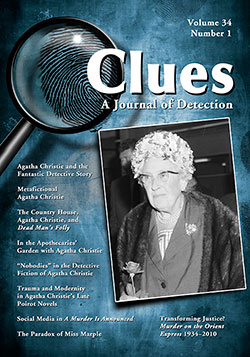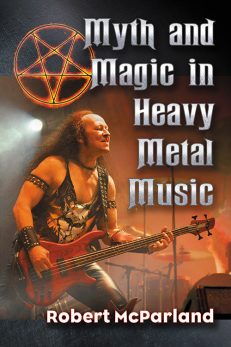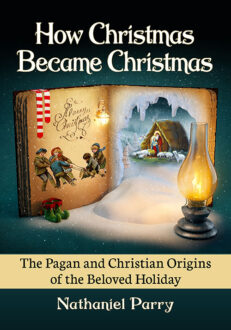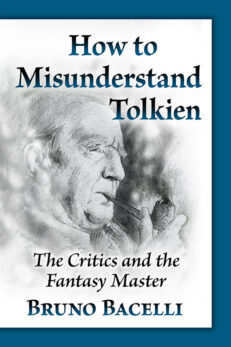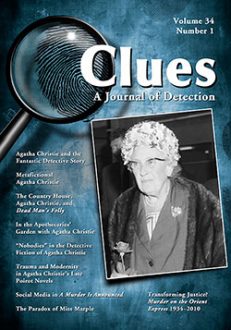Clues: A Journal of Detection, Vol. 34, No. 1 (Spring 2016)
Print Back Issue$30.00
In stock
About the Book
BACK ISSUE
This is a single back issue only. To order a current subscription, or for more information, please visit the journal’s web page at CluesJournal.com. Back issues from earlier volumes of Clues are available for order subject to availability. Also, single issues of the current volume may be ordered one at a time. Individuals may order back issues directly from our online catalog, and the charge for individuals is $30 (excluding postage). Issues from Volume 33 to the present are also available in ebook format on Kindle, Nook and Google Play.
The charge for single issues for institutions is $75 per issue (excluding postage). If your institution requires a back issue, please contact us to order at the appropriate rate.
About the Author(s)
Bibliographic Details
Executive Editor Janice M. Allan
Managing Editor Elizabeth Foxwell
Consulting Editor Margaret Kinsman
Format: softcover (7 x 10), back issue
Pages: 160
Bibliographic Info:
Copyright Date: 2016
ISSN 0742-4248
Imprint: McFarland
Table of Contents
Theme Issue: Reappropriating Agatha Christie
Guest Editors: Alistair Rolls and Jesper Gulddal
Reappropriating Agatha Christie: An Introduction
Alistair Rolls and Jesper Gulddal 5
The Agatha Christie corpus has long been encumbered by agendas and critical perspectives that effectively prevent close analytical scrutiny of her novels.
The authors explore possible avenues for a reappropriation of Christie and particularly highlight the need for irreverent rereading that brings to light the textual complexity of her detective fiction.
“Beautiful Shining Order”: Detective Authority in Agatha Christie’s Murder on the Orient Express
Jesper Gulddal 11
Using the work of Pierre Bayard, this essay presents a “counterinvestigative” reading of Murder on the Orient Express (1934) that highlights the undermining of Poirot’s unshakable authority as a detective and his solution. The essay argues that the dénouement fails in accomplishing complete transparency and reducing the literary complexity of Christie’s plot.
Agatha Christie and the Fantastic Detective Story
Suzanne Van Der Beek 22
The author problematizes the restrictive categorization of Agatha Christie’s novel And Then There Were None via the critique by Tzvetan Todorov in his study on the literary fantastic. Christie’s work, she argues, overthrows the dichotomy between the natural and the supernatural as well as creates a fantastic detective novel.
Metafictional Agatha Christie: Self-Parody as the Perfect Crime
Irena Księżopolska 31
The author examines the narrative structure of The Murder of Roger Ackroyd, emphasizing the self-reflexive quality of the novel and seeking to establish its parodic intentions. Through the use of formulaic unreliability, clichéd characters, facile plot devices, and a comic detective, Agatha Christie deliberately constructs her text against the conventions of the genre.
Transforming Justice? Murder on the Orient Express 1934–2010
Merja Makinen with Patrick Phillips 41
This essay compares the Agatha Christie novel Murder on the Orient Express (1934) and the Phillip Martin adaptation (2010). Viewing adaptations as transformations, the essay analyzes four differences; genre production, violence, justice, and Hercule Poirot, to argue for two differently rich texts sharing the same plot and characters across different media.
Agatha Christie’s Dead Man’s Folly: Stagnation, Negation, and Adaptation
Alistair Rolls 52
Two film adaptations of Agatha Christie’s Dead Man’s Folly can assist in deconstructing the novel as a textual folly. A comparison of Dead Man’s Folly to The Body in the Library reveals that Christie’s tricks in the latter text, which may or may not have fooled Miss Marple, are also played on Hercule Poirot.
A Fitting End: The Country House, Agatha Christie, and Dead Man’s Folly
Stuart Barnett 63
Agatha Christie is often associated with the English country house and, by extension, a conservative and nostalgic politics. However, examination of her work—in particular, Dead Man’s Folly (1956)—reveals a pointed critique of the class of country-house owners.
In the Apothecaries’ Garden with Agatha Christie
Sylvia A. Pamboukian 72
A dispensary assistant in her youth, Agatha Christie always depicted poisons in her fiction as complex entities, at once plant, medicine, and poison. In texts spanning her long career, Christie undermined clichés about the nature of poisons, poisoning, and the poisoner, especially through the character of gardener-sleuth Miss Marple.
Mundane or Menacing? “Nobodies” in the Detective Fiction of Agatha Christie
Nicola Bishop 82
In the changing cultural perceptions of clerks, Agatha Christie moves from characterizing two-dimensional “nobodies” to developing menacingly anonymous super-criminals. In examining the position of the clerk within early-twentieth-century culture, the author offers a new class reading of Christie’s middlebrow fiction.
Nowadays: Trauma and Modernity in Agatha Christie’s Late Poirot Novels
Jessica Gildersleeve 96
Agatha Christie’s last-written Hercule Poirot novels, Hallowe’en Party (1969) and Elephants Can Remember (1972), enact a social and cultural anxiety arising from the problems of modernity and the need to know and understand the past so as to prevent its traumatic return. Only in this way can the detective enact justice.
The Paradox of Miss Marple: Agatha Christie’s Epistemology
Kimberly Maslin 105
In creating her spinster sleuth, Agatha Christie challenges the dominant paradigm of objective, detached, and methodically acquired knowledge by legitimating intuitive and situated knowledge. Her epistemic approach, however, is not so clear since in her attempt to verify feminine epistemologies, Miss Marple resorts to traditional standards of verifiable knowledge.
“This Isn’t a Detective Story, Mrs. Oliver”: The Case of the Fictitious Author Françoise Grauby 116
The character of Ariadne Oliver shows the “posture” of the author at work. Repressing the rational stage of composition creates a mythologized figure that inhabits a world of pure fiction. But Mrs. Oliver, by channeling Agatha Christie, also personifies a scrupulously thought-out writing plan.
Remediating Agatha Christie: Social Media in A Murder Is Announced
Keaghan Turner 126
Agatha Christie’s A Murder Is Announced (1950) is essentially a novel about social media. Approaching this vintage text from the digital age, with a focus on media and communications technologies, reveals startlingly similar anxieties surrounding identity and community, privacy and voyeurism, and isolation and violence. Christie’s novel is revealed as ahead of its time.
Review Essay
A Case of Ontology: Sherlock Holmes and New Critical Games of Shadows
Christopher Pittard 138
Book Reviews
Marty Knepper, Guest Book Review Editor
Isabel Anders. Miss Marple: Christian Sleuth. Phyllis M. Betz 150
John Curran. Agatha Christie’s Secret Notebooks: Fifty Years of Mysteries in the Making and Agatha Christie: Murder in the Making—More Stories and Secrets from
Her Notebooks. Diane M. Calhoun-French 152
Hilary Macaskill. Agatha Christie at Home. Rachel Franks 154
Agatha Christie Mallowan. Come, Tell Me How You Live: An Archaeological Memoir. Lynne Goldstein 155
Agatha Christie, auth.; Mathew Prichard, ed. The Grand Tour: Around the World with the Queen of Mystery. John Teel 157
Author Guidelines are on page 159
Book Reviews & Awards
- “Clues is a must-have for readers and writers of crime fiction. Scholarly, thought-provoking, wide-ranging in its topics, Clues covers the crime and thriller map.”—Sara Paretsky
- “A. Conan Doyle, notoriously resentful of Sherlock Holmes’s success, liked to scorn ‘police romances’ as less significant and worthy of his talents than his other literary work. If he could have read Clues, the thinking mystery reader’s journal, he would surely have felt differently—and learned much he never realized himself about even his own landmark contribution to the genre, from which so much else by others has flowed.”—Jon Lellenberg, U.S. agent for the Arthur Conan Doyle estate
- “I love reading Clues. Every issue provides thought-provoking, well-researched articles. The variety and scope of the material found in Clues makes an unparalleled, ongoing contribution to our understanding of the role of crime fiction in our culture, and the genre’s reflection of its time and society.”—Jan Burke, Edgar-winning author of The Messenger (2009)
- “Clues is an important journal. It carries the torch of tradition that is the backbone of detective fiction. It goes below the surface and gets to the heart of what makes the genre so fascinating and valid today”—Michael Connelly, author of the Harry Bosch novels, including The Overlook (2007)
- “for erudite and fascinating truths about mysteries, follow the clues to Clues, the scholarly journal that is an essential resource for every serious student of the mystery”—Carolyn Hart, author of Death Walked In (2008)
- “with scholarship ranging from Poe to Peters, nothing beats Clues”—Joan Hess, author of Mummy Dearest (2008).

